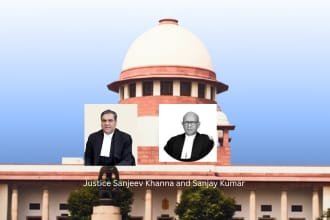In a significant ruling that clarifies the legal implications of social media interactions, the Allahabad High Court has held that merely liking a social media post does not amount to publication or transmission of that content under Section 67 of the Information Technology (IT) Act, 2000. This decision has far-reaching implications for freedom of expression, digital privacy, and criminal liability in the age of social media.
The ruling came in the case titled Imran Khan v. State of UP and Another, where the petitioner sought the quashing of a criminal case registered against him for liking a Facebook post associated with a protest gathering.
Liking a Post is Not Publishing It
Justice Saurabh Srivastava, while delivering the judgment, drew a clear line between liking, sharing, and posting content online. He ruled that:
“A post or message can be said to be published when it is posted, and transmitted when it is shared or retweeted. Liking a post will not amount to publishing or transmitting the post.”
This observation provides judicial clarity on the role of passive interaction—such as liking a post—versus active dissemination like posting or sharing, especially when it comes to criminal liability under cyber laws.
Section 67 of IT Act: Only for Obscene Content
Section 67 of the Information Technology Act deals with punishment for publishing or transmitting obscene material in electronic form. It criminalizes content that is “lascivious” or that “appeals to the prurient interest.” The High Court clarified that:
“Section 67 is meant for obscene material and cannot be invoked for provocative material. The terms used in the section relate to sexual content, not to political or provocative speech.”
In this case, the prosecution argued that the post in question had the potential to incite unrest. However, the court ruled that such material—even if provocative—is not within the scope of Section 67 unless it has explicit obscene content.
Background: Why Was Imran Khan Booked?
Imran Khan, the petitioner, had liked a Facebook post made by one Chaudhari Farhan Usman. The post referred to a planned protest near the collectorate for submitting a memorandum to the President of India. Following the post, a group of around 600–700 people allegedly assembled without official permission, leading the Uttar Pradesh Police to file a case under various Indian Penal Code (IPC) provisions and Section 67 of the IT Act.
The police claimed that Khan’s social media activity contributed to unlawful assembly and could incite communal tension. They also alleged that the original post had been deleted, but similar content was found on WhatsApp and other platforms.
However, after examining the records, the Court found no offensive or provocative material posted or shared by Khan himself. His only visible action was that he had liked the original post.
No Criminal Offence Made Out
After hearing arguments from Advocates Abhishek Ankur Chaurasia and Diwan Saifullah Khan, who represented the petitioner, and reviewing the case diary, the Court held:
“There is no material which could connect the applicant with any objectionable post… there is no offensive post available in the Facebook and WhatsApp accounts of the applicant.”
The Court concluded that liking a post does not amount to criminal conduct, nor does it fulfill the elements required to attract either Section 67 of the IT Act or the IPC provisions applied by the police.
Judicial Clarity on Digital Expression
This decision is crucial in the context of increasing criminal prosecutions linked to digital expression in India. In an era where people often express agreement or solidarity through likes, shares, and comments, this judgment provides a much-needed boundary to prevent overreach by law enforcement.
If every “like” were considered endorsement or dissemination of unlawful content, millions of social media users could potentially face criminal prosecution, chilling free expression on digital platforms.
Implications for Future Cases
The judgment sets a precedent for distinguishing between intention and engagement. The Court emphasized that:
- Liking a post is passive—it does not promote or endorse the post in a legal sense.
- Posting or sharing a message could be construed as transmission or publication, depending on the content.
- Section 67 of the IT Act must be used strictly for obscene content, and not as a tool for suppressing dissent or protest-related activity.
This clarity will help courts and law enforcement differentiate between genuine threats to public order and legitimate digital activity protected by Article 19(1)(a) of the Constitution.
Legal and Social Takeaways
- Digital Freedom of Expression: The judgment safeguards online expression from arbitrary criminalization and reinforces the principle that digital footprints must be assessed with context and caution.
- Curbing Police Overreach: By quashing the FIR against Imran Khan, the Court sent a message against the indiscriminate use of cyber laws to curb dissent or punish participation in peaceful protest.
- Responsibility and Accountability: While the Court provided relief to passive digital actions, it also drew attention to active dissemination, indicating that those who post or share objectionable content may still be held liable.
- Section 67 IT Act – Narrow Interpretation: Courts will likely continue to adopt a restrictive interpretation of Section 67, limiting its application strictly to sexually explicit material.
Conclusion
The Allahabad High Court’s ruling in Imran Khan v. State of UP is a milestone in defining the limits of criminal liability for digital actions. It distinguishes between liking, sharing, and posting, bringing clarity to how courts should interpret online behavior under the IT Act.
As India’s digital population grows, judicial oversight like this is essential to protect constitutional rights and prevent misuse of cyber laws. This decision is a reminder that not every online interaction implies intent or culpability, and that justice must remain aligned with digital realities.


